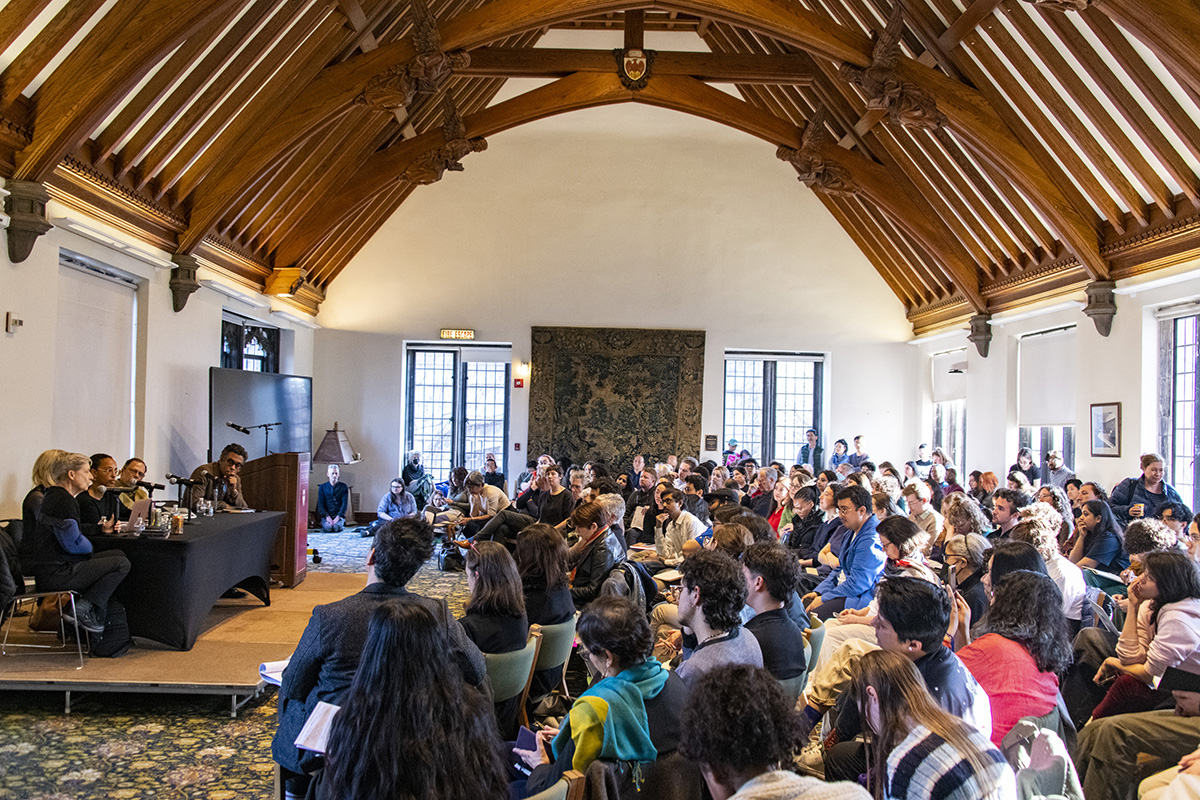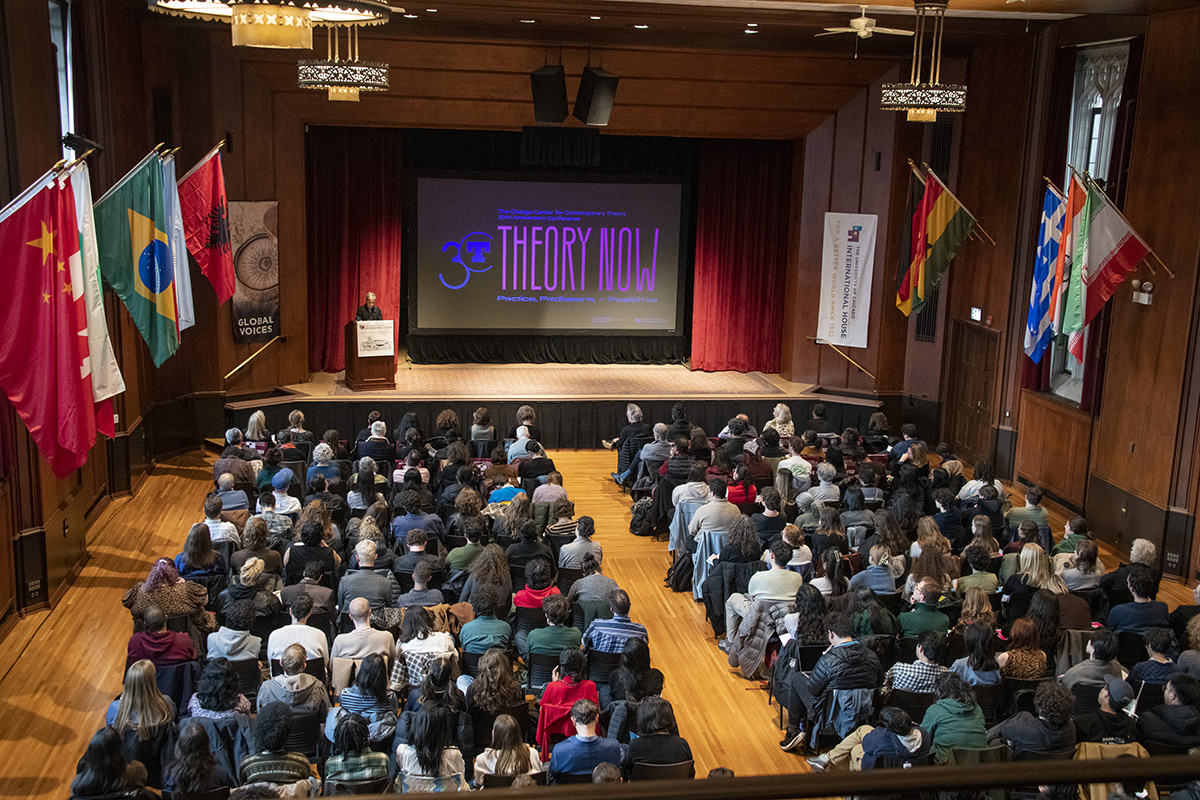3CT Celebrates 20 Years and Looks to the Future of Theory

The Chicago Center for Contemporary Theory (3CT) encourages people to come together, says 3CT fellow Rochona Majumdar, the George V. Bobrinskoy Professor of South Asian Languages and Civilizations, Cinema and Media Studies. “Whether it's to read something together, organize events, or to read work in progress, it is a very nourishing but critical space,” she says. “It’s the kind of space where there's room for everybody.”
To mark its 20th year of connecting scholars and students, and to make room for what the future of theory holds, 3CT held a two-day conference: “Theory Now: Practices, Predicaments, and Possibilities.” The April 10-11 event featured a keynote from Judith Butler and panel discussions with 3CT fellows in dialogue with friends of the center. The event was free and open to all.
“3CT began as a collective in 2004 with a self-imposed mandate to theorize the present,” says 3CT Faculty Director Lisa Wedeen, a founding member and the Mary R. Morton Distinguished Service Professor in the Department of Political Science. “We saw the need for an intellectual space to discuss new ways to analyze the contemporary without being presentist, to understand, for example, how capitalism operates in a post-Fordist era; how new creative readings with and through the global south might illuminate chronic conundrums in fresh and salutary ways; how the world had outrun the vocabularies being used in scholarly discourse to describe and explain it. We undertook to offer new conceptual repertoires in light of this felt deficiency.”
To get a sense of the history that 3CT is celebrating, Wedeen references its events and initiatives. For example, the series “Theorizing the Present”, which features scholars whose work is engaged with trying to understand the contemporary moment. 3CT faculty fellows take ownership of projects and develop research communities that align with the topic, which exist for several years and involve faculty within and outside of the center. One such example is the Reimagining Cosmopolitanism project — co-sponsored by the Neubauer Collegium — which is wrapping up with a large conference showcasing an edited volume that emerged from that process.
As the theme of the conference suggests, the event isn’t just marking the anniversary of the center, which serves as a place for scholars interested in questions of contemporary theory; it’s also an opportunity to consider broader questions: Where does theory come from? What are the boundaries between the university and the world in which theory is produced? How urgent is theory and how does it help us understand our current moment?
Majumdar says the conference’s organizing group wanted the event to have a historical arc. “[We were] figuring out what the conception of theory was when the center began, and how it has evolved over the years due to national and international changes: in political economy, the environment, in notions of personhood, migration, and geopolitics.”
Wedeen acknowledges that some questions persist since 3CT’s founding, and that its members continue to question what kinds of philosophical ideas are best suited to diagnose current situations. But in the last 20 years, even the terms “contemporary” and “present” have “emerged with different valences, inviting questions to be addressed at the conference about our changing relation to the conceptual armatures we bring to events to make sense of them,” she says.
“To abstract from these current events, to think about continuities and change, to cultivate novel modes of attunement, and to make a case for why theory matters in the face of an array of worldwide instances of devastation, exhaustion, and pain — these are some of the remits 3CT has embraced and which fellows and guests will address,” Wedeen says.
The choice of keynote speaker Judith Butler, the gender studies scholar and — most recently — author of Who’s Afraid of Gender?, was made because of their influential work transcending multiple fields, including political theory, rhetoric, literature, psychoanalysis, gender and sexuality, and contemporary politics. Although it was important to have someone of Butler’s stature open the conference, the Center didn’t just want a marquee event; the decision was made to organize a day of panels as well.
The second day of the conference will include conversations with 3CT faculty and others. Topics will include locations and temporalities of theory, race and theory, the purpose of theory, and a closing panel that features Butler in conversation with Wedeen and others.
“Our goal was to involve as many people as possible who are current 3CT fellows, but also people who are not fellows, but who have a footprint in our events,” Majumdar says. “We wanted to include people who are 3CT alumni from when they were graduate students. 3CT was a formative influence for many students outside their home departments.”
The organizers wanted to include individuals at all stages of their careers. Filling out a robust and diverse roster, Majumdar says, was an enriching task, allowing the fellows to grasp how many people have been involved in 3CT and are friends and supporters of the center.

The organizers hoped the event will reach across the student body, as well as attracting many scholars from UChicago and beyond. For more experienced attendees, one goal was to expand their ways of looking at the world; while younger attendees will be encouraged to consider the myriad benefits of interdisciplinary work.
“I think one of the powers of theory is to allow your work to be translated beyond and across disciplines across borders and boundaries of nation-states,” Majumdar says. “And I hope that this conference is going to be a good illustration of that to our audience.”
The aim will be for all participants to feel challenged, with the 3CT fellows themselves looking to hear of creative directions in which the center might grow. “Theory Now” is intended to be a venue for offering insights, giving people new ways to think, and to serve as an example of what good, thorough, critical, and civil discourse looks like. As Majumdar expressed, the opportunity is to explore in the context of community; or, as Wedeen puts it, “to experience intellectual solidarity while also treasuring the engaged disagreement inside our collegium.”
“Theory Now: Practices, Predicaments, and Possibilities”
Keynote: Thursday, April 10, 5:00pm
International House, 1414 E. 59th St.
Panels: Friday, April 11, 9:30am–6:30pm
Swift Lecture Hall, 1025 E. 58th St.
 THE UNIVERSITY OF CHICAGO
THE UNIVERSITY OF CHICAGO



